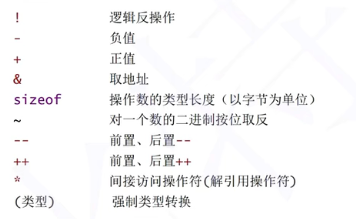Shift operators
Shift right
The right shift is divided into:
Arithmetic shift: discard the right and fill the original symbol bit on the left
Shift left: 0, fill right: 0
Positive shift method
A binary number contains the inverse complement of the original code
When shifting, the complement is moved
Positive number
For example:
int a=16;
Original code, inverse code and complement code are
00000000000000000000000000010000
If a is shifted one bit to the right
int b = a>>1;
The right side of the complement is discarded and the sign bit is added to the left.
The complement becomes: 000000000000000000000000000
Because the original and inverse complement of positive numbers are the same, they are converted to decimal.
a becomes 8.
Negative shift method
For example:
int a=-1; int b=a>>1;
The binary source code whose first bit is sign bit a is
10000000000000000000000000000001
Inverse code: the sign bit remains unchanged, and other bits are reversed
111111111111111111111111111111111110
Complement: inverse code + 1
111111111111111111111111111111111111
After moving right
Lost the 1 on the right and added a 1 on the left. There is no change
So after moving right, b is still - 1.
Shift left
There is only one way
Discard on the left and fill 0 on the right
Bitwise operators
Bitwise operators are:
&Bitwise AND;
|Bitwise OR;
^Bitwise XOR;
Bitwise AND
int c = a&b;
Compare the complement. If the complement binary of a is the same as that of b, the binary bit of c is 1;
For example, complement a: 00000000000000000101
Complement b: 0000000000000000000000
Complement c: 0000000000000000000000
Bitwise OR
int c = a|b;
Compare the complement. If the complement binary of a is the same as that of b, one bit is 1, then the binary bit of c is 1;
For example, complement a: 0000000000000111
Complement b: 0000000000000000000000
Complement c: 000000000000000000111
Bitwise XOR
int c = a^b;
Compare the complement. In the complement of c, if the complement binary of a is the same as that of b, the bit is 0 and the different bit is 1;
For example, complement a: 0000000000000111
Complement b: 0000000000000000000000
Complement c: 000000000000000000000000000000 11
Practical interview questions
Exchange the values of integer a and integer b without establishing temporary variables
Writing 1: simple writing
int main()
{
int a = 3;
int b = 5;
a = a + b;
b = a - b;
a = a - b;
printf("a = %d\nb = %d ", a, b);
return 0;
}Notation 2: XOR notation
Use the value of a ^ b as the password.
int main()
{
int a = 3;
int b = 5;
a = a ^ b;
b = a ^ b;
a = a ^ b;
printf("a = %d\nb = %d ", a, b);
return 0;
}HKCEE, but not practical.
Exercise: find the number of 1 in the binary number of an integer stored in memory
The first way to write: negative numbers are not available
#include<stdio.h>
int main()
{
int a = 0;
scanf("%d", &a);
int count = 0;
while (a)
{
if (a % 2 == 1)
count++;
a = a / 2;
}
printf("%d", count);
return 0;
}Assignment operator
Compound assignor
int a = 0; a+=1 == a=a+1; a&=1 a*=2 a*=2 a%=2
Like this
unary operator
There is only one operand

! Operator
True becomes false, false becomes true
int a = 0; a=!a; a==1;
int a = 10; a=!a; a==0;
Application scenario
int a = 0;
if(!a)//If a is false, print hehe
{
printf("hehe\n");
}Fetch address operator&
int a = 10; int* p = &a;//Store the address of a with a pointer *P ; //Dereference operation, the result is the value of a
Type length of operand sizeof
int main()
{
char c = '0';
int arr[10] = { 0 };
int a = 0;
char* p = &c;
printf("%d", sizeof(a));//4
printf("%d", sizeof(int));
printf("%d", sizeof(c));//1
printf("%d", sizeof(char));
printf("%d", sizeof(p));//4
printf("%d", sizeof(char*));
printf("%d", sizeof(arr));//40
printf("%d", sizeof(int[10]));
//For arrays, removing the name leaves the type
}For arrays, the only thing left after removing the name is the type
Classic questions
int main()
{
short s = 0;
int a = 0;
printf("%d\n", sizeof(s = a + 5));
printf("%d\n", s);
}Guests are welcome. sizeof is short integer
The value of s has not changed.
So it's printed out as 2 and 0